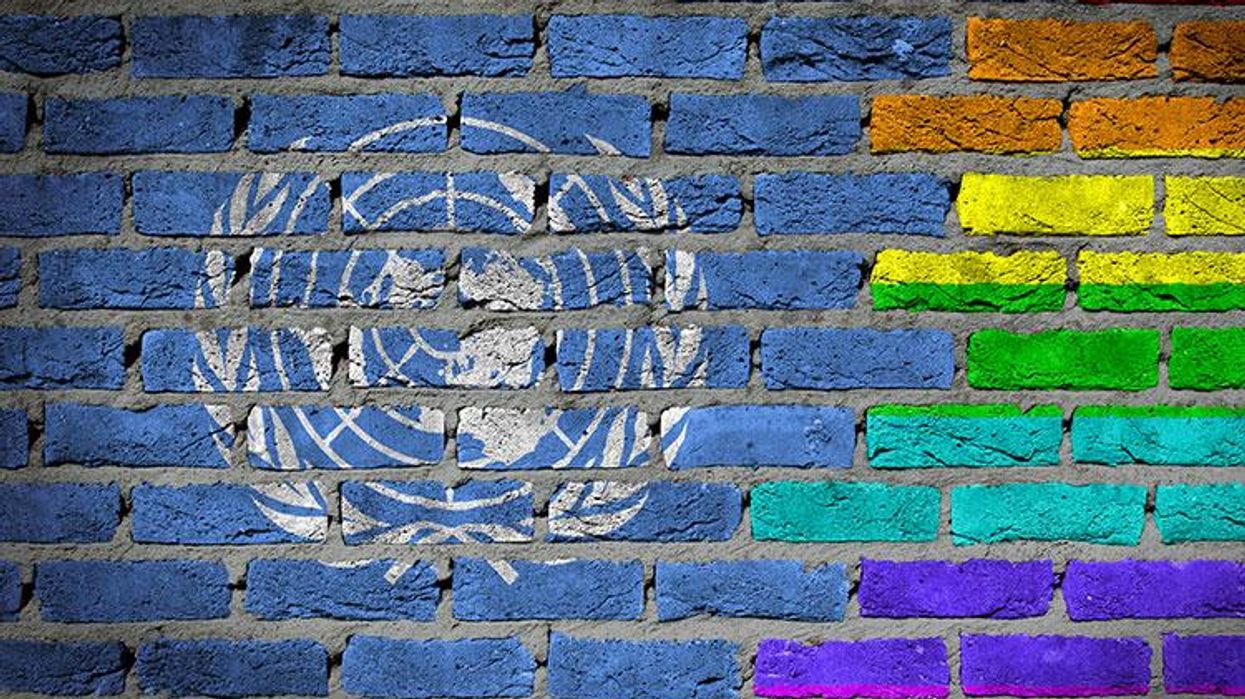On the campaign trail, Donald Trump claimed he'd protect "the gays" against people who wanted to kill them because of their sexual orientation. But now his United Nations representatives have voted against a resolution condemning the use of the death penalty as punishment for consensual same-sex relations.
The U.S. was one of 13 countries voting against the U.N. Human Rights Council resolution, which passed with the support of 27 countries Friday, the Washington Blade reports. Seven countries abstained.
However, a State Department spokesperson released a statement to The Advocate saying, "The United States voted against this resolution because of broader concerns with the resolution's approach in condemning the death penalty in all circumstances and calling for its abolition."
Jason Mack, a U.S. delegate to the Human Rights Council, told the gathering Friday, "The United States is disappointed to have to vote against this resolution. We had hoped for a balanced and inclusive resolution that would better reflect the positions of states that continue to apply the death penalty lawfully, as the United States does."
The resolution condemns "the imposition of the death penalty as a sanction for specific forms of conduct, such as apostasy, blasphemy, adultery and consensual same-sex relations," and expresses "serious concern that the application of the death penalty for adultery is disproportionately imposed on women."
Despite voting against the resolution, the U.S. government "unequivocally condemns the application of the death penalty for conduct such as homosexuality, blasphemy, adultery and apostasy," the State Department spokesperson said.
The resolution further condemns "the use of the death penalty against persons with mental or intellectual disabilities, persons below 18 years of age at the time of the commission of the crime, and pregnant women." It "calls upon States that have not yet abolished the death penalty to ensure that it is not applied on the basis of discriminatory laws or as a result of discriminatory or arbitrary application of the law."
In voting against it, the U.S. joined Botswana, Burundi, Egypt, Ethiopia, Bangladesh, China, India, Iraq, Japan, Qatar, Saudi Arabia, and the United Arab Emirates. Voting for it were Congo, Cote d'Ivoire, Ghana, Rwanda, South Africa, Togo, Kyrgyzstan, Mongolia, Albania, Croatia, Georgia, Hungary, Latvia, Slovenia, Bolivia, Brazil, Ecuador, El Salvador, Panama, Paraguay, Venezuela, Belgium, Germany, the Netherlands, Portugal, Switzerland, and the U.K. Kenya, Nigeria, Tunisia, Indonesia, the Philippines, South Korea, and Cuba abstained.
Belgium, Benin, Costa Rica, France, Mexico, Moldova, Mongolia, and Switzerland introduced the resolution, which won't force member countries to take action but does constitute an important statement against certain applications of the death penalty. "It is unconscionable to think that there are hundreds of millions of people living in states where somebody may be executed simply because of whom they love," said Renato Sabbadini, executive director of the International Lesbian, Gay, Bisexual, Trans and Intersex Association, said in a press release. "This is a monumental moment where the international community has publicly highlighted that these horrific laws simply must end."
The U.S. also backed some amendments aimed at watering down the resolution. "The U.S. supported two of them from Russia that stated the death penalty 'does not per se mean a (human rights) violation, but may lead to . . . (human rights) violations' and 'in some cases the (death penalty) leads to torture, rather than that many states hold that the (death penalty) is a form of torture,'" the Blade reports. These did not pass, nor did an amendment from Egypt that the U.S. supported, stating that "a moratorium [on the death penalty] should be a decision after domestic debate."
The Human Rights Campaign denounced the U.S. vote against the resolution and specifically Nikki Haley, U.S. ambassador to the U.N. "Ambassador Haley has failed the LGBTQ community by not standing up against the barbaric use of the death penalty to punish individuals in same-sex relationships," said a statement from Ty Cobb, director of HRC Global. "While the U.N. Human Rights Council took this crucially important step, the Trump/Pence administration failed to show leadership on the world stage by not championing this critical measure. This administration's blatant disregard for human rights and LGBTQ lives around the world is beyond disgraceful."
After the mass shooting at Orlando's Pulse gay nightclub last year, Trump had said he would protect LGBT people from being killed by terrorists, but he appeared to have foreign governments in mind too: "Ask the gays what they think and what they do, in, not only Saudi Arabia, but many of these countries, and then you tell me -- who's your friend, Donald Trump or Hillary Clinton?"















Charlie Kirk DID say stoning gay people was the 'perfect law' — and these other heinous quotes
These are some of his worst comments about LGBTQ+ people made by Charlie Kirk.